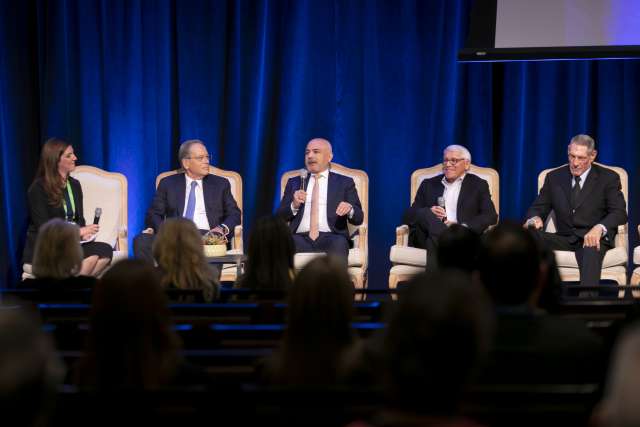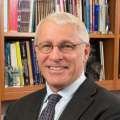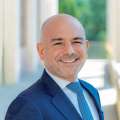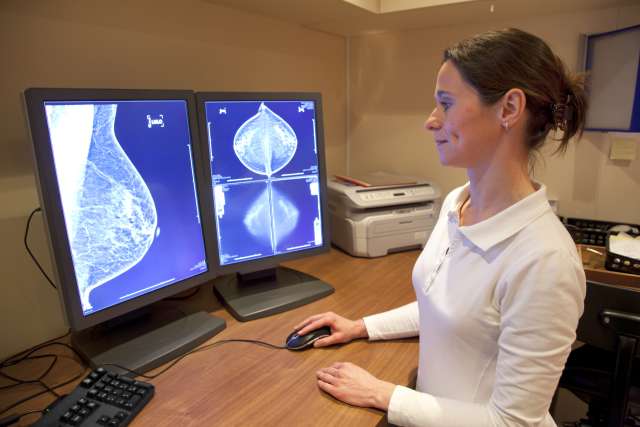Three of the six founding donors of the , announced by California Gov. Gavin Newsom in January 2024, gathered recently to discuss how the new institute will support scientific discoveries and groundbreaking medical treatments.
UCLA Health physicians , and , a special adviser for immunology initiatives at UCLA Health, along with Gary Michelson, MD, discussed their inspiration and plans for the institute at the annual LA Bioscience Ecosystem Summit, held in May 2024 on the UCLA campus.
Three other founding donors – Meyer Luskin, Michael Milken and Sean Parker – were not present. Funding for the public-private partnership also includes a $500 million pledge from the state of California. The institute will be part of the new UCLA Research Park, being developed in what used to be the Westside Pavilion mall.
The California Institute for Immunology and Immunotherapy is “a unique opportunity to grow biotech innovation here in Los Angeles,” said Lindsey Williams, assistant vice chancellor of health sciences development at the .
The institute’s mission is to develop vaccines and treatments for cancer and other diseases, said Dr. Michelson, a retired orthopedic surgeon and founder and co-chair of Michelson Philanthropies.
“As a philanthropist, I cannot think of any place to invest the money that would have the impact, the return on investment that a vaccine does,” he said. “We're going to make these discoveries and we're going to convert those into immunotherapies immediately. That’s our goal.”
Translating academic research into tangible treatments has traditionally been a slow process, which Dr. Michelson attributed to “a reluctance among academia to embrace commercialization.”
“That’s a mistake,” he said.
“We need to develop the mentality of more startups and more funding,” added Dr. Belldegrun, a urologic oncologist and founder of Kite Pharma, which develops novel cancer immunotherapy treatments.
The institute will be structured to facilitate formation of new business entities by relying on donations and sponsorships to support startups founded on scientific innovations, the founders said.
“The philanthropy for this institute will enable us eventually to start companies,” said Dr. Belldegrun, a member of the . “We hope that will generate an evergreen situation by which … UCLA and California will benefit from the proceeds of each of the companies and it will feed and generate the entrepreneurial spirit here in Los Angeles.”
The intention is to have “an internal, self-funded incubator-accelerator,” Dr. Michelson said. “We plan on being the nucleus for an entire ecosystem of biotech startups.”
“It will hopefully stimulate the opportunity for scientists to be more innovative and take more risks,” Dr. Esrailian said. While it’s still important for scientists to pursue grants, he said, the kind of novel studies the institute aims to support – research that results in accessible treatments for patients – “requires our private participation.”
Immunology and immunotherapy are ideal subjects for this research because the breadth of immunology “covers almost every human disease and can be a part of treatment for hundreds of different diseases,” said Dr. Witte, also a member of the UCLA Health Jonsson Comprehensive Cancer Center.
Immunology is the study of the immune system, the body’s natural defense mechanism against infectious diseases and foreign substances. Immunotherapy is a form of treatment that harnesses this natural defense system to fight diseases, including cancer.
Immunotherapy treatments are revolutionizing cancer care and show promise in treating autoimmune disorders and other diseases, such as Alzheimer’s. Research in immunology and immunotherapy has led to HIV treatments, monoclonal antibody-based treatments and messenger RNA vaccines, like those created to protect against COVID-19.
“Every single human disease has, as a part of its pathology, something to do with inflammation and the immune response,” Dr. Witte said. “It unifies people from multiple medical disciplines, different areas of research and all the technology bases into a common theme.”
Researchers from across the state are invited to collaborate at the California Institute for Immunology and Immunotherapy, which is currently seeking partners and researchers. It is slated to open in 2027.






